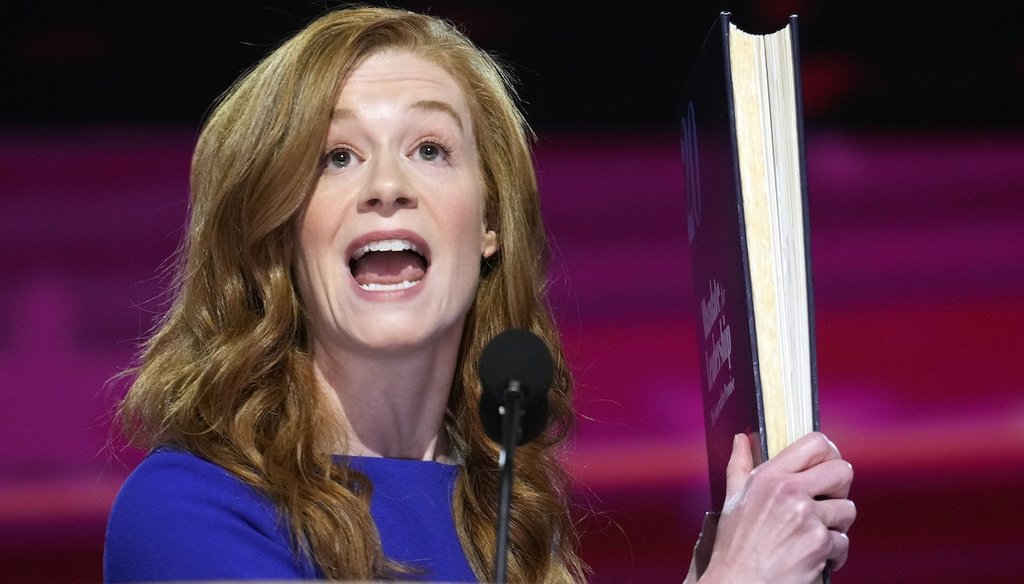Stand up for the facts!
Our only agenda is to publish the truth so you can be an informed participant in democracy.
We need your help.
I would like to contribute

Michigan State Senator Mallory McMorrow holds up a copy of Project 2025 during the first night of the 2024 Democratic National Convention in Chicago. (AP)
Project 2025 has a starring role in this week’s Democratic National Convention.
And it was front and center on Night 1.
"This is Project 2025," Michigan state Sen. Mallory McMorrow, D-Royal Oak, said as she laid a hardbound copy of the 900-page document on the lectern. "Over the next four nights, you are going to hear a lot about what is in this 900-page document. Why? Because this is the Republican blueprint for a second Trump term."
Vice President Kamala Harris, the Democratic presidential nominee, has warned Americans about "Trump’s Project 2025" agenda — even though former President Donald Trump doesn’t claim the conservative presidential transition document.
"Donald Trump wants to take our country backward," Harris said July 23 in Milwaukee. "He and his extreme Project 2025 agenda will weaken the middle class. Like, we know we got to take this seriously, and can you believe they put that thing in writing?"
Sign up for PolitiFact texts
Minnesota Gov. Tim Walz, Harris’ running mate, has joined in on the talking point.
"Don't believe (Trump) when he's playing dumb about this Project 2025. He knows exactly what it'll do," Walz said Aug. 9 in Glendale, Arizona.
Trump’s campaign has worked to build distance from the project, which the Heritage Foundation, a conservative think tank, led with contributions from dozens of conservative groups.
Much of the plan calls for extensive executive-branch overhauls and draws on both long-standing conservative principles, such as tax cuts, and more recent culture war issues. It lays out recommendations for disbanding the Commerce and Education departments, eliminating certain climate protections and consolidating more power to the president.
Project 2025 offers a sweeping vision for a Republican-led executive branch, and some of its policies mirror Trump’s 2024 agenda, But Harris and her presidential campaign have at times gone too far in describing what the project calls for and how closely the plans overlap with Trump’s campaign.
PolitiFact researched Harris’ warnings about how the plan would affect reproductive rights, federal entitlement programs and education, just as we did for President Joe Biden’s Project 2025 rhetoric. Here’s what the project does and doesn’t call for, and how it squares with Trump’s positions.
To distance himself from Project 2025 amid the Democratic attacks, Trump wrote on Truth Social that he "knows nothing" about it and has "no idea" who is in charge of it. (CNN identified at least 140 former advisers from the Trump administration who have been involved.)
The Heritage Foundation sought contributions from more than 100 conservative organizations for its policy vision for the next Republican presidency, which was published in 2023.
Project 2025 is now winding down some of its policy operations, and director Paul Dans, a former Trump administration official, is stepping down, The Washington Post reported July 30. Trump campaign managers Susie Wiles and Chris LaCivita denounced the document.
However, Project 2025 contributors include a number of high-ranking officials from Trump’s first administration, including former White House adviser Peter Navarro and former Housing and Urban Development Secretary Ben Carson.
A recently released recording of Russell Vought, a Project 2025 author and the former director of Trump’s Office of Management and Budget, showed Vought saying Trump’s "very supportive of what we do." He said Trump was only distancing himself because Democrats were making a bogeyman out of the document.
The Harris campaign shared a graphic on X that claimed "Trump’s Project 2025 plan for workers" would "go after birth control and ban abortion nationwide."
The plan doesn’t call to ban abortion nationwide, though its recommendations could curtail some contraceptives and limit abortion access.
What’s known about Trump’s abortion agenda neither lines up with Harris’ description nor Project 2025’s wish list.
Project 2025 says the Health and Human Services Department should "return to being known as the Department of Life by explicitly rejecting the notion that abortion is health care."
It recommends that the Food and Drug Administration reverse its 2000 approval of mifepristone, the first pill taken in a two-drug regimen for a medication abortion. Medication is the most common form of abortion in the U.S. — accounting for around 63% in 2023.
If mifepristone were to remain approved, Project 2025 recommends new rules, such as cutting its use from 10 weeks into pregnancy to seven. It would have to be provided to patients in person — part of the group’s efforts to limit access to the drug by mail. In June, the U.S. Supreme Court rejected a legal challenge to mifepristone’s FDA approval over procedural grounds.
The manual also calls for the Justice Department to enforce the 1873 Comstock Act on mifepristone, which bans the mailing of "obscene" materials. Abortion access supporters fear that a strict interpretation of the law could go further to ban mailing the materials used in procedural abortions, such as surgical instruments and equipment.
The plan proposes withholding federal money from states that don’t report to the Centers for Disease Control and Prevention how many abortions take place within their borders. The plan also would prohibit abortion providers, such as Planned Parenthood, from receiving Medicaid funds. It also calls for the Department of Health and Human Services to ensure that the training of medical professionals, including doctors and nurses, omits abortion training.
The document says some forms of emergency contraception — particularly Ella, a pill that can be taken within five days of unprotected sex to prevent pregnancy — should be excluded from no-cost coverage. The Affordable Care Act requires most private health insurers to cover recommended preventive services, which involves a range of birth control methods, including emergency contraception.
Trump has recently said states should decide abortion regulations and that he wouldn’t block access to contraceptives. Trump said during his June 27 debate with Biden that he wouldn’t ban mifepristone after the Supreme Court "approved" it. But the court rejected the lawsuit based on standing, not the case’s merits. He has not weighed in on the Comstock Act or said whether he supports it being used to block abortion medication, or other kinds of abortions.
"When you read (Project 2025)," Harris told a crowd July 23 in Wisconsin, "you will see, Donald Trump intends to cut Social Security and Medicare."
The Project 2025 document does not call for Social Security cuts. None of its 10 references to Social Security addresses plans for cutting the program.
Harris also misleads about Trump’s Social Security views.
In his earlier campaigns and before he was a politician, Trump said about a half-dozen times that he’s open to major overhauls of Social Security, including cuts and privatization. More recently, in a March 2024 CNBC interview, Trump said of entitlement programs such as Social Security, "There’s a lot you can do in terms of entitlements, in terms of cutting." However, he quickly walked that statement back, and his CNBC comment stands at odds with essentially everything else Trump has said during the 2024 presidential campaign.
Trump’s campaign website says that not "a single penny" should be cut from Social Security. We rated Harris’ claim that Trump intends to cut Social Security Mostly False.
Project 2025 does propose changes to Medicare, including making Medicare Advantage, the private insurance offering in Medicare, the "default" enrollment option. Unlike Original Medicare, Medicare Advantage plans have provider networks and can also require prior authorization, meaning that the plan can approve or deny certain services. Original Medicare plans don’t have prior authorization requirements.
The manual also calls for repealing health policies enacted under Biden, such as the Inflation Reduction Act. The law enabled Medicare to negotiate with drugmakers for the first time in history, and recently resulted in an agreement with drug companies to lower the prices of 10 expensive prescriptions for Medicare enrollees.
Trump, however, has said repeatedly during the 2024 presidential campaign that he will not cut Medicare.
The Harris campaign said Project 2025 would "eliminate the U.S. Department of Education" — and that’s accurate. Project 2025 says federal education policy "should be limited and, ultimately, the federal Department of Education should be eliminated." The plan scales back the federal government’s role in education policy and devolves the functions that remain to other agencies.
Aside from eliminating the department, the project also proposes scrapping the Biden administration’s Title IX revision, which prohibits discrimination based on sexual orientation and gender identity. It also would let states opt out of federal education programs and calls for passing a federal parents’ bill of rights similar to ones passed in some Republican-led state legislatures.
Republicans, including Trump, have pledged to close the department, which gained its status in 1979 within Democratic President Jimmy Carter’s presidential Cabinet.
In one of his Agenda 47 policy videos, Trump promised to close the department and "to send all education work and needs back to the states." Eliminating the department would have to go through Congress.
In the graphic, the Harris campaign says Project 2025 allows "employers to stop paying workers for overtime work."
The plan doesn’t call for banning overtime wages. It recommends changes to some Occupational Safety and Health Administration, or OSHA, regulations and to overtime rules. Some changes, if enacted, could result in some people losing overtime protections, experts told us.
The document proposes that the Labor Department maintain an overtime threshold "that does not punish businesses in lower-cost regions (e.g., the southeast United States)." This threshold is the amount of money executive, administrative or professional employees need to make for an employer to exempt them from overtime pay under the Fair Labor Standards Act.
In 2019, the Trump’s administration finalized a rule that expanded overtime pay eligibility to most salaried workers earning less than about $35,568, which it said made about 1.3 million more workers eligible for overtime pay. The Trump-era threshold is high enough to cover most line workers in lower-cost regions, Project 2025 said.
The Biden administration raised that threshold to $43,888 beginning July 1, and that will rise to $58,656 on Jan. 1, 2025. That would grant overtime eligibility to about 4 million workers, the Labor Department said.
It’s unclear how many workers Project 2025’s proposal to return to the Trump-era overtime threshold in some parts of the country would affect, but experts said some would presumably lose the right to overtime wages.
Other overtime proposals in Project 2025’s plan include allowing some workers to choose to accumulate paid time off instead of overtime pay, or to work more hours in one week and fewer in the next, rather than receive overtime.
Trump’s past with overtime pay is complicated. In 2016, the Obama administration said it would raise the overtime to salaried workers earning less than $47,476 a year, about double the exemption level set in 2004 of $23,660 a year.
But when a judge blocked the Obama rule, the Trump administration didn’t challenge the court ruling. Instead it set its own overtime threshold, which raised the amount, but by less than Obama.
RELATED: What Project 2025 would do with nonpolitical federal workers, immigration policy
Our Sources
See sources linked in article






































